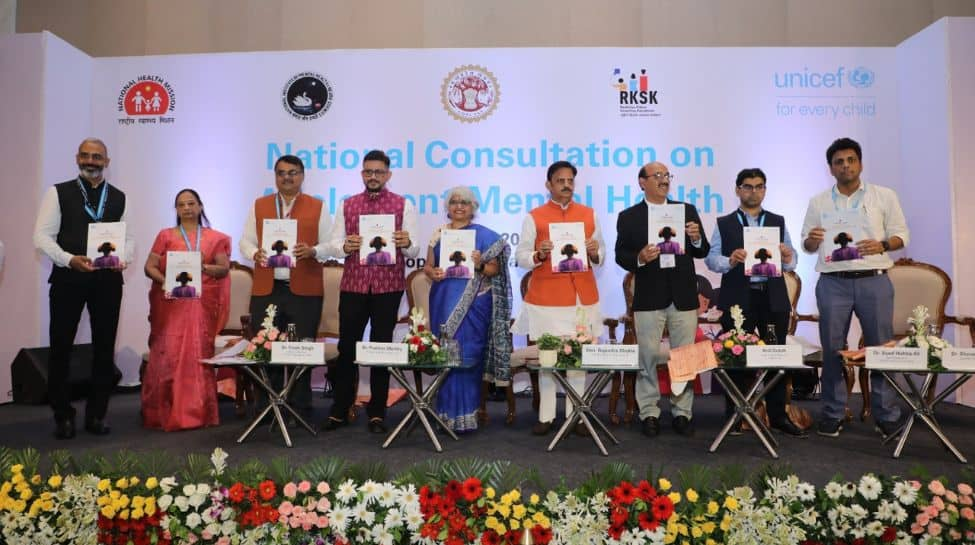To enhance support for the growing mental health needs of young people, the Ministry of Health and Family Welfare (MoHFW), in partnership with UNICEF and the National Institute of Mental Health and Neurosciences (NIMHANS), launched a national fact sheet on adolescent and youth mental health. Alongside this, a supplementary training module titled ‘I Support My Friends’ was introduced as an addition to the existing adolescent peer-support module under the Rashtriya Kishor Swasthya Karyakram (RKSK) programme. The launch took place during a national consultation held in Bhopal today.
This new module addresses the urgent need to equip adolescents with practical skills to recognize emotional distress, provide empathetic support, and connect peers to appropriate services—while also maintaining their well-being and boundaries.
Adapted from a global resource developed by UNICEF and WHO and contextualized for India by NIMHANS, the one-day training is structured around the Look, Listen, Link approach. It incorporates interactive exercises, scenario-based learning, and guided reflection to build emotional awareness, effective communication, and responsible peer support.
Speaking at the launch event, N. Shivaji Patel, Minister of State for Health, Madhya Pradesh, highlighted the importance of listening to and supporting young people, stating, “Adolescents today face immense pressures—be it from academics, families, or their social environments. We must create systems that allow them to speak up, be heard, and feel supported. Investing in their mental wellbeing is not just a policy priority; it is a moral responsibility and a commitment to our shared future.”
Also, speaking on the occasion, Rajendra Shukla, Hon’ble Deputy Chief Minister, Madhya Pradesh, said, “Empowering our adolescents with the tools to care for their mental wellbeing—and that of their peers—is an investment in the future of Madhya Pradesh and the nation. With initiatives like RKSK and the new peer-support addendum, we are building a society where young people are heard, supported, and equipped to thrive.”
Dr Zoya Ali Rizvi, Deputy Commissioner for Adolescent Health, MoHFW, noted that the launch of the module forms part of a wider national vision for mental health policy and practice. She said, “India is moving toward a more integrated, youth-responsive mental health system.
Our goal is to create national guidelines that empower early prevention, strengthen local systems, and support adolescents through evidence-based tools like the peer-support module.”
Dr Chandni Tugnait, MD (A.M), Psychotherapist, Life Alchemist, Coach & Healer, Founder & Director, Gateway of Healing shares her opinion on peer support critical for adolescent mental health. She adds, ” In today’s world, where adolescents often turn to their peers before adults, peer support has become an important first line of mental health care. The launch of the ‘I Support My Friends’ module under the RKSK recognizes that teens are not just recipients of care, but capable supporters too. The framework equips them to identify distress, offer empathy, and connect friends to further help, while safeguarding their boundaries. This isn’t about making adolescents therapists; it’s about giving them the tools to respond with compassion and confidence. As emotional challenges rise amid academic and social pressures, peer-led interventions can create a ripple of awareness, reducing stigma and building a culture where asking for help is normal, and offering it is empowering.”
Dr. Pratima Murthy, Director of NIMHANS, highlighted the need to initiate mental health support early and integrate it into everyday settings, such as schools and community spaces. “Given the complex mental health needs of young people, consultations like this—bringing together technical experts, youth, policymakers, decision-makers, and media—can play a vital role in addressing unmet needs and advancing the country’s vision of a Viksit Bharat.”
Dr. Vivek Singh, Chief of Health (a.i.), UNICEF India, reflected on the remarkable progress India has made in mental health in recent times. “We must move from reactive care to proactive, community-rooted mental health systems. There is also a need to focus on an integrated mental health framework. UNICEF is committed to supporting the government on this shift through scalable, youth-led approaches.”
Anil Gulati, Chief of Field Office a.i., UNICEF Madhya Pradesh, said, “State and community systems are key to translating national mental health priorities into real change for adolescents. By fostering safe spaces, training peer supporters, and enabling frontline workers, we can ensure that every young person—regardless of where they live—has access to support, understanding, and hope.”
Sessions highlighted the need for early support and reducing stigma around mental health conditions such as anxiety, low self-esteem, digital addiction, depression, and self-harm among adolescents. Discussions pointed to perception, family expectations, academic pressure, and relationship conflict as key stressors. Youth advocates from across India also shared their experiences, reinforcing the importance of creating safe, supportive spaces for young people.

